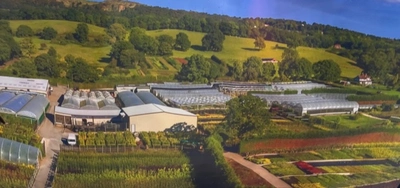
Every year Millbrook attends the Garden Centre Association (GCA) conference where we have the opportunity to listen to a range of inspirational speakers, including Ed Gillespie and Mark Stevenson, known as The Futurenauts. At the event they challenged us about the impact our industry is having on the planet, but also helped us to see the unique position we're in - that gardeners and garden centres can be a really positive force in mitigating climate change.
I've talked before about the importance of soil to the health of our gardens and plants, helping them to grow stronger and more resistant to pests and disease. But I've never really considered just how much carbon is stored in our garden soil and the potential there is to increase this and remove carbon from the atmosphere.
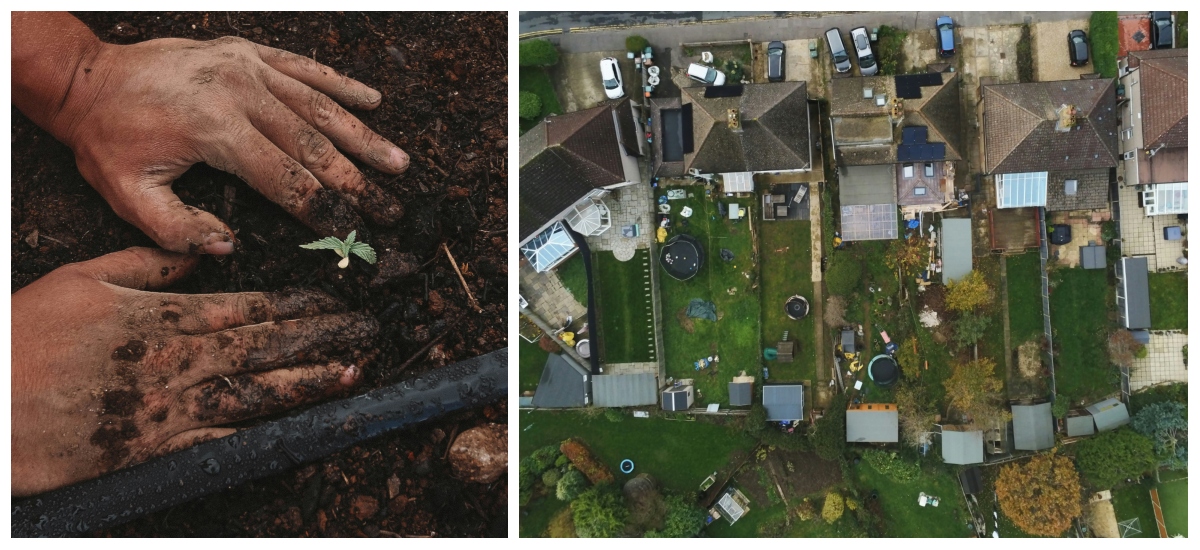
(Image credit left to right: Greenforce Staffing on Unsplash, John Mosquera on Unsplash)
The total area of gardens in the UK is estimated to be about 4,330 square kilometres – just over a one fifth the size of Wales. In England all our gardens combined cover an area 4 ½ times larger than that of our National Nature reserves. Soil holds 3 x as much carbon as the atmosphere and it's estimated in the UK our soil holds about 10 billion tonnes of carbon, roughly equivalent to 80 years of annual greenhouse gas emissions. Sadly intensive farming has caused arable soils to lose about 40-60% of their organic carbon. This fact made me think about our gardens, how we landscape and grow has a direct impact on our soil’s organic carbon storage and what we can do to improve this.
Stop digging!
In the world of regenerative farming ‘no-till’ or ‘no-plough’ agriculture is becoming more mainstream and is actively encouraged by the government through the sustainable faming scheme. The idea is to disturb the soil as little as possible. Digging destroys the natural structure of the soil, leading to hard compacted ground that doesn’t store as much water and creates run-off. Digging also destroys the unseen network of microbes and mycorrhizal fungi that we now know support the roots and growth of plants. Plus it releases stored carbon into the atmosphere rather than keeping it locked in the earth.
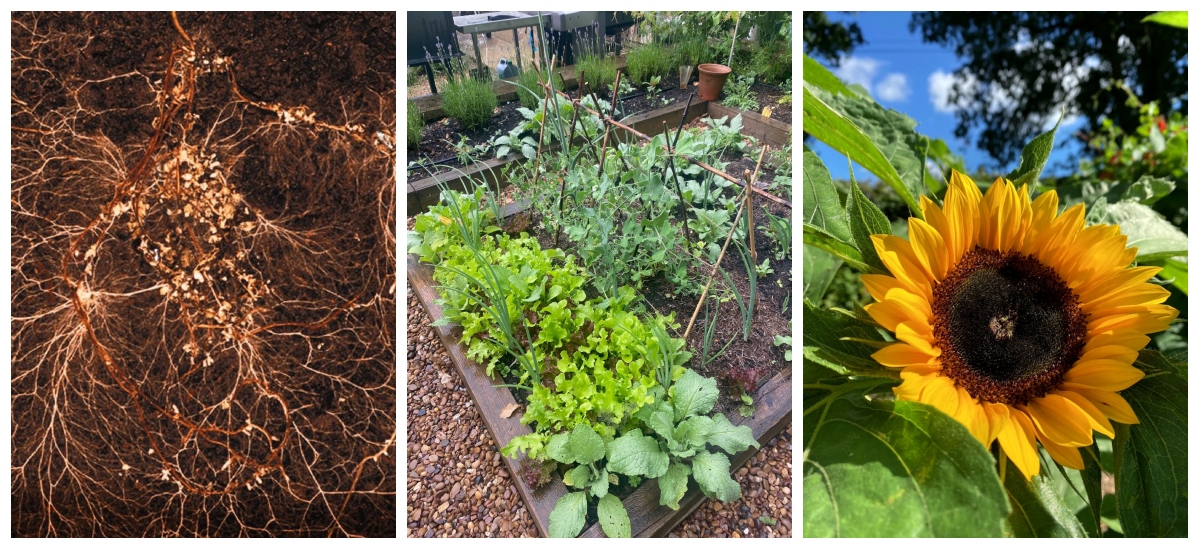
(Image credit left to right: Millbrook suppliers Empathy and Tammy's no-dig vegetable patch and sunflowers)
So forget the back breaking double digging! You can still shallow hoe any new weeds that pop up or dig holes to plant new plants, but otherwise leave well alone and let the worms do their work. I went 'no-dig' in my veg garden a couple of years ago and I can already see the benefits – my seeds are sprouting more quickly and growing strongly, there are more worms and I seem to need to water less in the summer. Win win!
Start Composting
I tried to look at some stats about how many people make their own compost in the UK and this information doesn’t seem to exist– perhaps we will carry out our own Millbrook customer survey (apparently 55% of households in New Zealand home compost so I wonder how that compares to us?). I did discover that a single home compost bin diverts approximately 150kg of waste from landfill each year, according to the charity Garden Organic and that 60% of household rubbish could be composted. 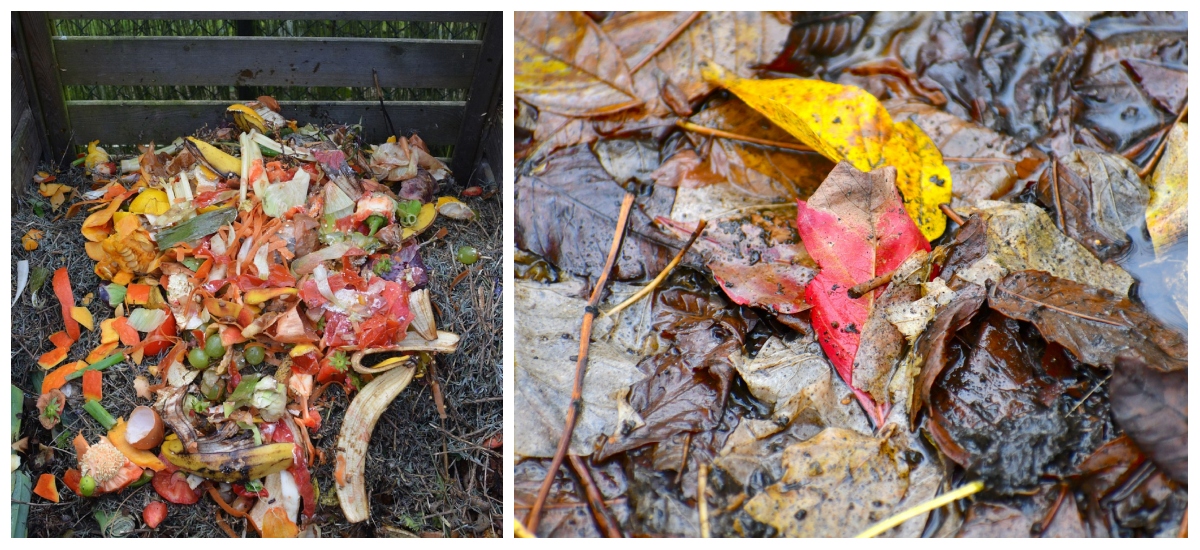
(Image credits: Ralph Katieb on Unsplash)
The carbon benefits of home composting are huge – even waste that is recycled in council waste collections has an environmental cost in terms of transport and industrial processing.
Food that's dumped into landfill breaks down without oxygen and produces methane which is an even more potent greenhouse gas than carbon dioxide. Just think what a difference 100% of households composting at home would make. Plus it’s actually really easy to do, and there’s lots of articles and advice online. I even wrote a blog on this for Millbrook - How to compost at home!
The key thing is don’t worry too much about the process or get too caught up in creating the right blend of green (nitrogen) and brown (carbon) waste. I genuinely never remember to turn mine and it still breaks down (maybe more slowly) into a lovely crumbly compost.
The RHS say that it's the best way to make use of your garden waste – everything from lawn clippings, weeds, hedge trimmings, shredded wood and cuttings, plus plan- based kitchen waste along with torn up paper and cardboard. The best news is that it is free to make (not great for a garden centre but brilliant for you!) and really improves your soil, helping to store even more carbon away and grow stronger, more resilient plants.
Improve your soil
Get mulching – having made all that lovely compost you now need to use it on your garden. Coupled with no-dig adding a layer of organic matter every year onto your beds improves the structure of the soil, replenishes nutrients, suppresses weeds, retains moisture, protects plants from extreme temperatures and traps more carbon into the soil. Ideally you never want to leave your soil bare. You don’t need to be too tidy in the autumn, leave the fallen leaves through the winter, as decaying matter feeds the living organisms in the soil and again locks up more carbon.
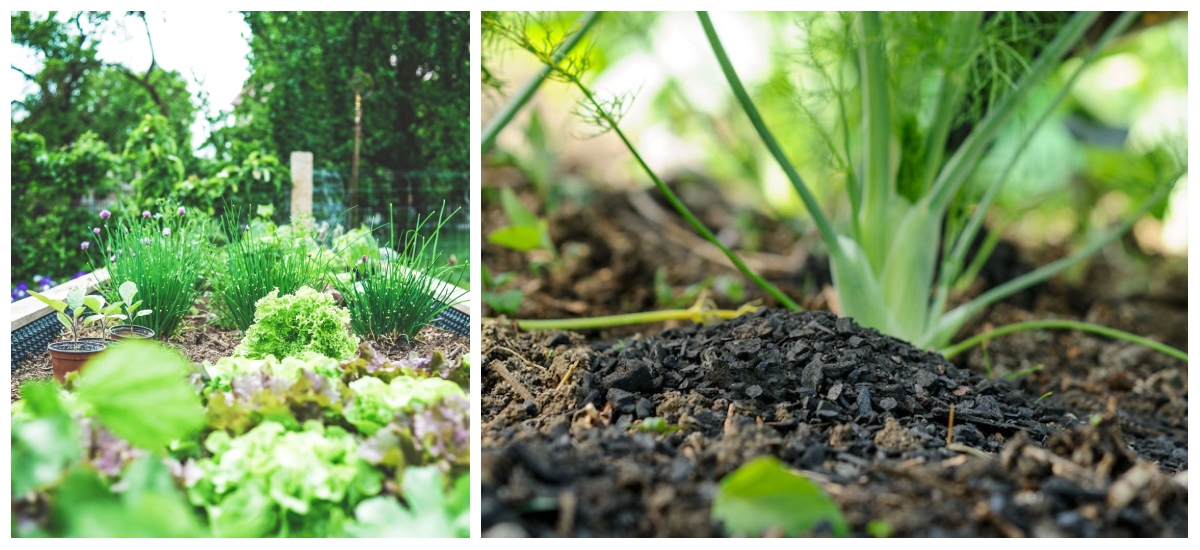
(Image credit left to right: Markus Spiske on Unsplash and Carbon Gold Biochar)
Scientists and gardeners are becoming more excited about the addition of biochar to soil. This is organic matter that has been carbonised (burnt) under very high temperatures with little oxygen and this process removes carbon from the atmosphere which is then stored, potentially for thousands of years, in our soil. For every 1kg of biochar used in the ground, 3kg of carbon is removed from the atmosphere.
For gardeners this is available as Carbon Gold Biochar, a product we’ve just started selling. Alongside the reduction of greenhouse gases it also improves soil fertility and water retention by increasing soil aeration and structure. They also claim that adding it to your compost bins will speed up the composting process by promoting microbial activity. I’m definitely going to give it a go in my garden and compost bin this year.
The other benefit of regularly adding organic matter to your soil is that you won’t need to use artificial fertilisers which are very carbon intensive to make, and although give your plants a short term boost, don’t improve the soil for the longer term.
Plant more Plants
Through photosynthesis plants draw down carbon dioxide from the atmosphere so it seems obvious that more plants = less carbon. Aim for a variety of plants of different shapes and sizes, covering the soil and creating layers of plants for all seasons. Plants with a woody framework like shrubs, trees and hedges lock up the most carbon and give structure to your garden. I firmly believe that every home needs at least one tree and there is one for every shape and size of garden. Research by the RHS shows that if every gardener in the UK (30 million) planted a medium tree such as a hawthorn, cherry or apple tree and let it grow to maturity they would store the same amount of carbon as driving 284 billion miles.

(Image credit left to right: Perennial plants at Millbrook Staplehurst and David Vig on Unsplash)
Go for a permanent planting scheme that will come back year after year using hardy perennials rather than annuals therefore reducing the need to dig. Remember to choose the right plant for the right place. Something growing where it's happy will grow more strongly than a plant in the wrong conditions.
I've been talking about the carbon benefits to gardening regeneratively, using our gardens to help reverse climate change, but everything I've mentioned will make your garden more resilient to our changing weather, more appealing for wildlife, better for your plants and your own mental health and wellbeing too – what’s not to love?
Sometimes we can feel pretty powerless to make a difference in a world where so much feels out of our control, but think what a difference collectively we could make if every single one of our 23 million gardens in the UK was cultivated in this way. So come on who is up for the challenge?


